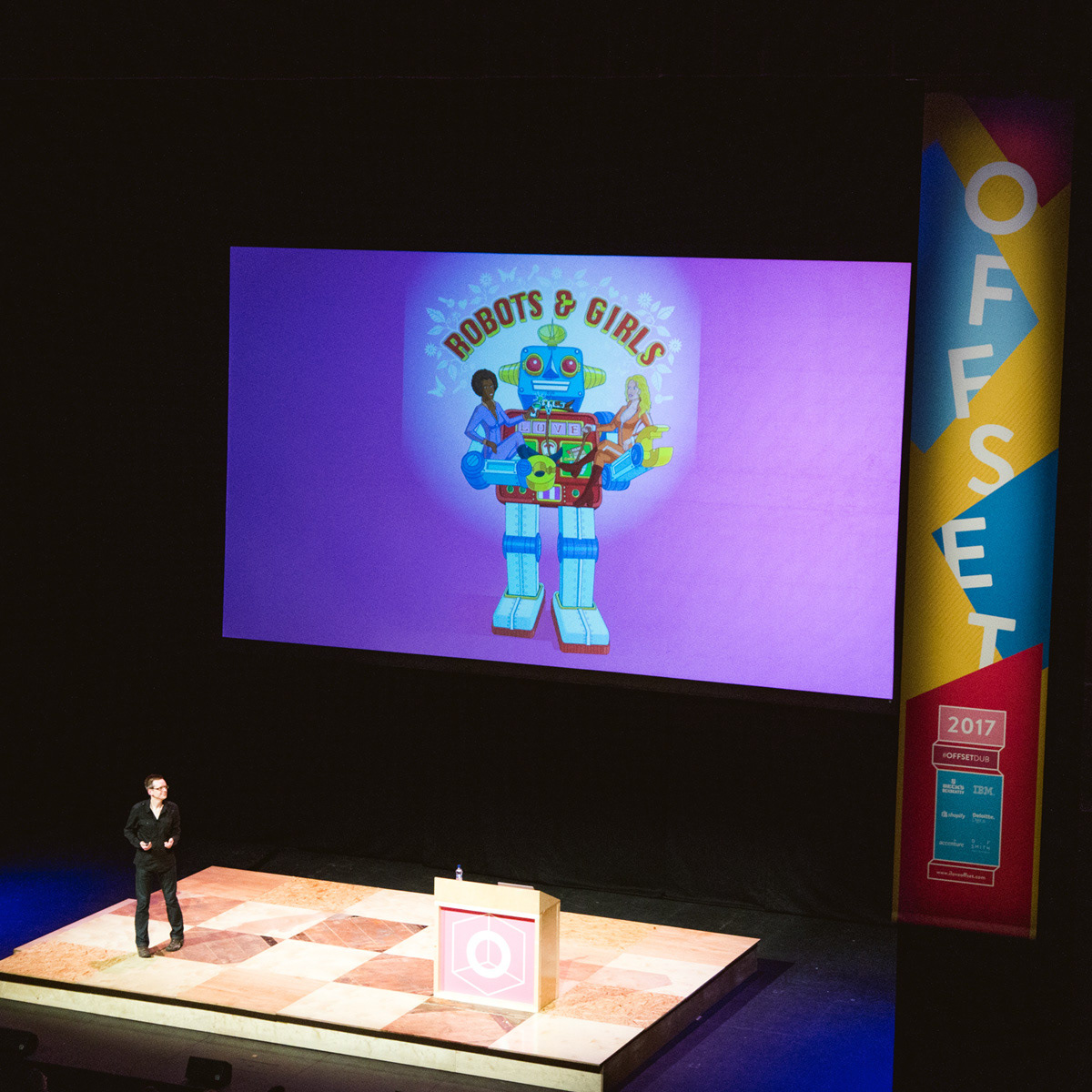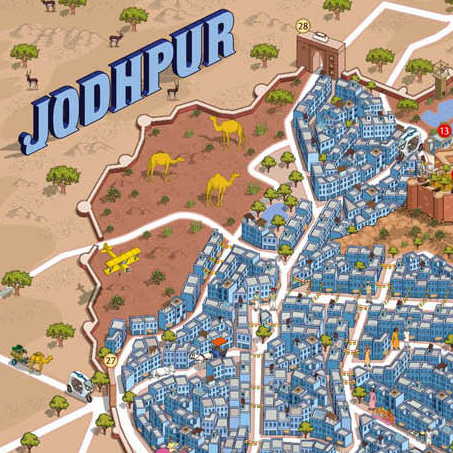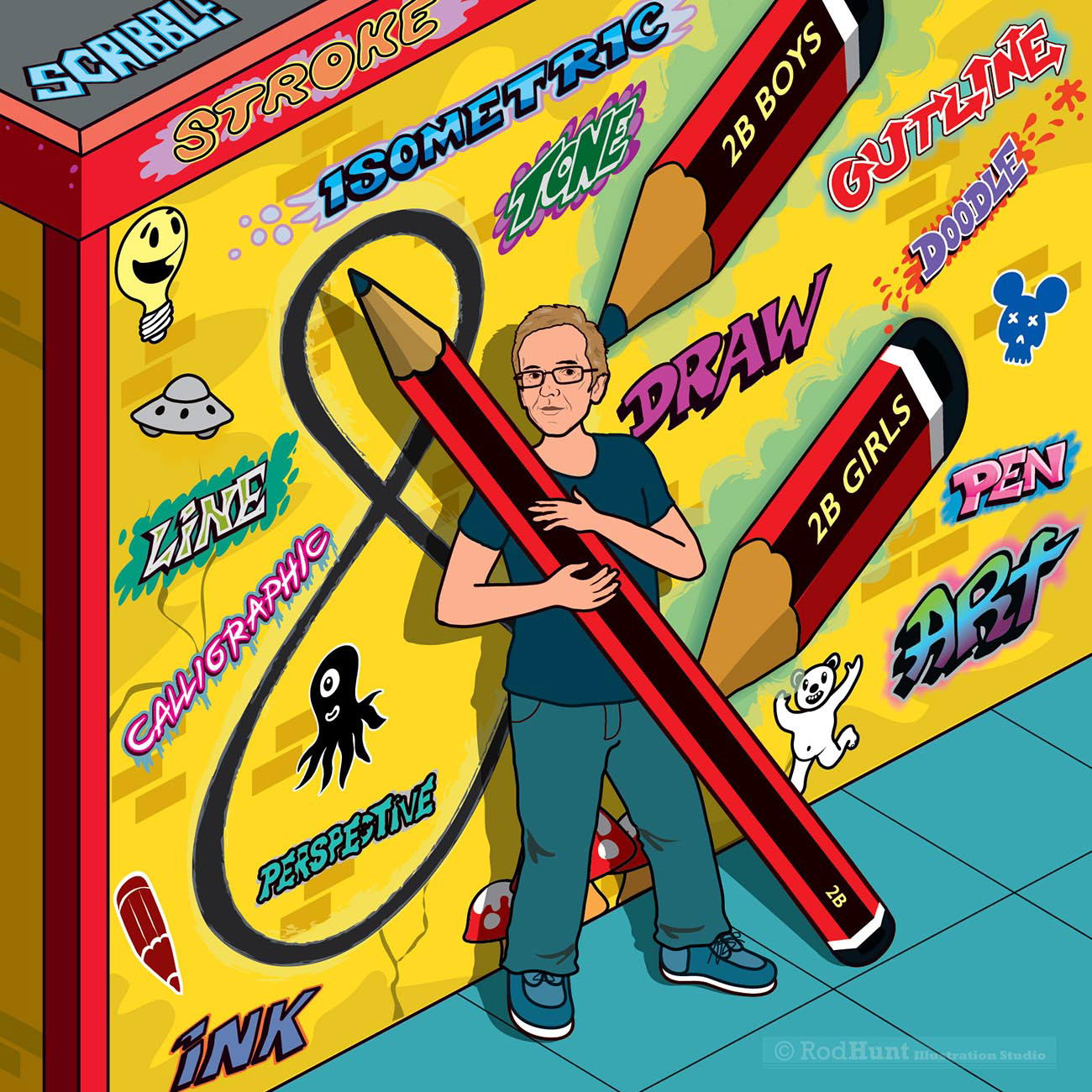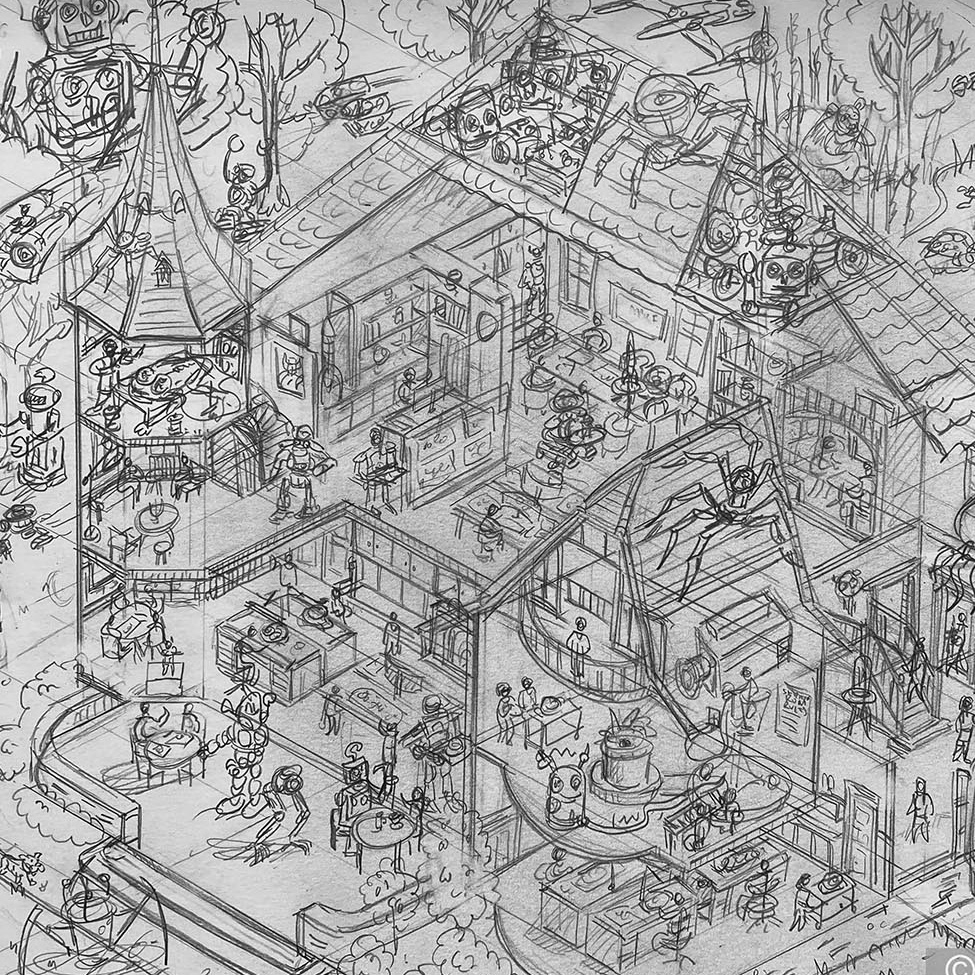Rod Hunt is an award winning London based illustrator and map artist specialising in detailed character filled illustrations and isometric maps. Here he shares some advice and tips from his 30 years experience as a freelance illustrator.
Did you find starting as a freelancer daunting? What were some of the key things you did at the start that helped you build your success?
Don’t try to do things in a vacuum, seek professional advice when you need it as it will save you a lot of time, stress and even money. I had business advice and training from my local business enterprise agency as well as business start-up support from the Princes Trust enterprise program in the form of a business mentor for the first year, a grant and a loan. I also joined the Association of Illustrators for specific illustration industry advice and support.
I feel being a member of the AOI is a vital part of a professional illustration career. Being freelance can be a bit isolating and being part of the AOI can give you a sense that you’re not alone in this, you’re part of a community and you know where to get professional advice.
It’s vitally important to educate yourself about the business side of things. Understanding pricing, copyright, contracts, etc is just as important as the drawing if you want to be successful and sustain your career for the long term. That is just one phone call or email away by being a member of the AOI.
Anything else you wish you known when you started off as a freelance illustrator?
Perseverance and patience. It will probably take longer than you anticipated to get established, it took me around seven years before I felt I was more secure with regular clients. You may have to change, adapt and learn new skills to full reach your potential.
You are a business providing a service, so service the client’s needs and make sure they have confidence in working with you. Professionalism, courtesy, good time management, excellent communication skills and ideas are vital.
It important to respond to enquiries in a timely fashion, so check your email and voice messages regularly. Make sure to check your spam folder every day too, emails can get missed! Clients can be working to a tight schedule and if you take several days to get back to them it’s likely they’ll go elsewhere. I’ve heard tales from art directors contacting half a dozen illustrator about a job and they only ever hear back from one or two of them inside a day or two. Don’t fall at the first hurdle, you might be perfect for that job.
Above all you must meet the agreed deadline as often clients are working right down to the wire with time so your late artwork could mean costs incurred to them. If it looks like you can’t meet the deadline inform them as soon as possible. If you are unreliable you're probably not going to get repeat work from them and risk gaining a bad reputation.
Initially from the client I would expect an outline of the project including usage, rights needed and deadlines. Ideally they should supply a clearly written project out line or brief to make sure you’re all on the same page. If the details of the job are a little thin on the detail, don’t be afraid to ask questions. You need to be armed with all the facts especially when making a quote for a job
What are the warning signs that a client is trying to exploit you? And what should you do if you realise half-way through a project that you’re being exploited?
Ideally you realise that a client isn’t suitable to work with before you agree to take on the job. With experience you can often tell from an initial enquiry whether this is a suitable and serious enquiry or not.
Always use a contract, agreeing the fee, usage and deadlines upfront before you start the commission. The AOI has a standard Licence Agreement, Terms and Conditions that members can use. It’s got me out of trouble with clients when I've need to reiterate what exactly has been agreed.
Watch out for clients contract that say ‘Work for Hire’ or demands an assignment of your copyright in the work to them. ‘Work for Hire’ essentially means you work as the equivalent of an employee with none of the benefits of employment, and they’ll own the copyright in whatever they do for them during the job. Under usual circumstances there’s very little reason why they need to own copyright in your illustrations - copyright is valuable so it’s important to maintain your rights in your work.
Also remember that retrospective contracts are not enforceable in law, so get your contact in first when you’ve accepted the job that sets out the agreed terms of the commission. If a client sends you a contract after the job has been completed that demands you assign copyright to get paid, you are under no obligation to accept it.
It’s reasonable to expect one or two rounds of roughs and only minor changes to final artwork. You can’t have a situation with endless roughs and rolling changes to artwork. A ‘I’ll know it when i see it’ situation from a clients is not acceptable, there should be a clear end point. Asking for more money in these situations usually focuses minds.
If the job proves to be untenable, the issues cannot be resolved or the working relationship has broken down, then sometimes you have to walk away - it maybe be best for both parties. Be professional and take the emotion out of the situation. Ask for a ‘kill fee’ to cover the work done. Again, these ‘kill fee’ percentages should ideally already be in your contract.
Are there any instances where those starting out should turn down work? How choosy should they be?
Sometimes it’s right to turn down work, for instance if the client is asking you to do something unethical like copy another persons work or style. It’s better to be hired for being yourself.
I would also turn down a job if the client is demanding assignment of copyright and if unwilling to negotiate, or the fee is unrealistically low and does not reflect the actual worth of the job. It seems to follow that the clients who want to pay the least are often the most demanding. It doesn’t matter how you dress it up, a bad deal is a bad deal, it will do you no favours in the long run.
How important are client relationships?
I have many great clients I have worked with for years, so it’s important to maintain good relationships with your clients as they could turn into repeat commissions and long term relationships.
When you were first starting out, how do you find work?
It was pre-internet days when I started out, so I’d do postcard mailers directly to clients and up to 150 face to face portfolio meetings a year. I also paid for my work to be included in Source Books, which were expensive and had a long production schedule. Self-promotion has certainly changed a lot in 20 years! I think back to the 1990’s and wonder how as an artist I ever ran a creative business, promoted myself and gained commissions without the internet. I certainly wasn't able to reach international clients like I can today.
What are the best ways to promote yourself and your work? How important is bringing your personality to social media as well as showcasing your work?
The Internet is probably the first port of call for most clients these days when sourcing an illustrator – personal website, portfolio sites, blogs, inspiration sites, interviews, Instagram, Twitter, Flickr, Pinterest - I do all of these and more.
It’s important to have a clear and concise website that is easy for a client that is to navigate - just using a blog or instagram won’t cut it. This is your main shop front so it needs to look professional. It's also important to learn about the basics of Search Engine Optimisation (SEO) to optimise your website.
Get your work on Behance. Adobe’s portfolio portal is a great resource for clients and I get many enquiries from it. It’s important to use it right though. Use all your available keywords, ones that a client might search for when looking for a specific artist or specialism. Put up at least three images for a project and give some descriptive background text for each project. Think of each project like a case study.
I’m still a great believer in the value of targeted quality print promotion targeted direct to a client. In the past I’ve sent out a set of A5 postcards twice a year but more recently I’ve produce a 28 page full colour brochure – essentially a complete portfolio in a book - which I target at selected clients. It can an expensive exercise but has proved to be fruitful, and just one job can pay for everything and more. I've used mailing contact lists from bikinilists.com (a premium product but extensive contacts) and also TheAOI who's Client Directories are very affordable. This way I have up to date contacts so I don’t have to spend my valuable time researching thousands of names and keep the list up to date.
It’s important to budget for self-promotion as part of your business, you have to ‘speculate to accumulate’. I have budgeted up to 5-10% of my turnover a year for marketing, so as your turnover increases you increase the investment proportionally and expand your reach.
Social media is an important part of self-promotion, though less useful than it was with the algorithm changes in recent years. Twitter is good for getting news and opinions out, whereas Instagram is good for showcasing your work and showing a more personal side of your practice. But I wouldn't put chasing 'likes' on social media ahead of investing in a great portfolio website.
Get out there and get your work seen by as many people as possible. You should never be afraid to show people your work. It’s important to invest enough time and resources in promoting your work and explore all possible markets. You maybe the best illustrator in the world, but if no one sees your work you won’t get commissioned
I would try to avoid following trends, if you're chasing the trend you're probably already behind it. It's important to develop your own unique voice, be yourself and indulge your personal interests in your work. That will set you part from everyone else.
Above all doing great work is the best advert.
Did you start out with an agent or wait until you had some commercial commissions under your belt?
I didn’t have an agent for the first 6 or 7 years of my career. My work took time to develop before an agent was interested.
I think it’s useful to learn the ropes about the business and get some experience with clients before getting an agent, but there’s no real preference from agents. If someone has great work straight out of college they’ll definitely consider you.
Don’t carpet bomb all the agents with a standard and impersonal email. It’s important to get the right agent for you not just anyone. Do your research to see who could be a good fit and make your approach personal to them. Study their roster of artists, do you feel your work would be a good fit or you see a gap they don't represent?
But remember that agents may get hundreds of submissions a week and may only take on a few new artists a year. So don’t get disheartened if you don’t get immediate success, keep them updated with your new work once or twice a year, they may like what you do but the time isn’t right for them and could want to see how your work develops.
What advice would you give those looking to go freelance?
Be prepared and do your research before taking the plunge. The UK .Gov website has much of the necessary information about starting a business https://www.gov.uk/browse/business
When you go self employed in the UK you’ll need to inform the HMRC. The simplest way to become a business to register with them as a 'Sole Trader’. Down the line if your turnover increases significantly it maybe worth considering becoming a Limited Company to maximise your tax efficiency. You will definitely want to have the correct advice and hire an accountant at this point.
If possible have the means to help support yourself financially for several months until commissions start becoming regular and you receive your first payments. You may consider working part time employment until you're up to speed.
How would you recommend managing finances (whether through useful apps or hiring an accountant)?
When I started I did a short bookkeeping course so I knew how to do my business records. Save all your receipts from direct costs to your business - travel, materials, utilities, studio rent, equipment, accountant fees, etc, etc, and record everything on a spreadsheet for all your income and expenses.
For the first few years I did my own tax returns but now I've had an accountant for a long time. Using an accountant’s expertise is very useful as they will know how to limit your tax liability, what business expenses you can claim for and check you’ve got your figures correct. They’re the experts and know exactly what can and cannot be claimed for so will probably save you money overall as well as taking the pressure off filling out your tax return every year. If you’re busy the last thing you want is to stress out about your tax return more than necessary.
It's a lot easier to do book keeping these days using online accounting software - I use FreeAgent, the subscription is well worth it, makes life so much simpler.
Remember to put money aside for your tax bill, don’t just spend it all. There’s nothing worse than getting a tax bill at the end of the year and not having the money to pay it!
You won’t have to worry about charging VAT until your turnover reaches £90,000 a year in a 12 month period. If you do need to become VAT registered the “Flat Rate Scheme” is simpler and involves much less paperwork.
Everyone mentions this, but how important really is invoicing/chasing payment/cashflow etc - can it make or break you?
Always get your invoice submitted as soon as the job is completed. Not being paid on time can be a big problem if you haven't built up a cash reserve, especially if you’ve been working on a big job for a quite a while. If the job is over several months you could request a deposit or invoice the client in stages so part of the fee is paid sooner. It’s standard to give 30 days credit but you need to keep on top of credit control, so when 30 days are up contact the clients accounts department to remind them the invoice is now due.
In the event of persistent non-payment the last resort in the UK will be to take them to the Small Claims Court. Write to the accounts department giving them 5-7 days to pay or you will start proceedings. Usually just the threat of the Small Claims Court will make them pay up. Further information here gov.uk/make-court-claim-for-money/overview
How can new freelancers figure out what to charge for their skills?
Pricing is a difficult area for illustrators starting out and knowing what the really value of a piece is very important if you don’t want to be under charging. An illustration for a magazine might be in the hundreds of pounds area, where as a piece for an advertising campaign could be four or five figures. It’s important to get the right information, the Association of Illustrators has a comprehensive online pricing calculator for members to use as well as offering bespoke advice via members hotline. Getting the right fee on just one job could make you more than the membership fee in one go. Also if you have a network of illustrator friends you can bat round fees between yourselves for a second opinion.
And what if you're tempted to work for free to get ‘a foot in the door’?
It’s usually never a good idea to work for free, anyone who say’s “this will be great for your exposure and portfolio” should be declined. Exposure is something you die of when you can’t afford a roof over your head.
Would you ask a plumber or an electrician to work for free or for the exposure? Of course not, so why should skilled creative professionals be expected work for free. One of the rules of thumb I use is if the person commissioning you is being paid, then so should you.
I have done a few projects pro-bono for AIDES the French not-for-profit HIV/AIDS awareness organisation, but everyone involved was working for free including the advertising agency. Plus I felt it was an important cause to support.
Should you send a load of speculative emails?
Carpet bomb emailing speculative contacts isn’t a good idea. If it’s someone you want to work for do your research on them, make a personal approach and get their name right.
Even though I’m not in a position to employ anyone or give internships I regularly get speculative emails from people. If it’s a generic email they’ve copy and pasted, cc’d to hundreds of people and not even bothered to address it to me personally I just delete it. Someone who’s made the effort I’ll reply to them. If I do that, so will potential clients who are very busy people and won’t be impressed by someone just using the minimum effort.
Is networking, attending events and meet ups useful?
Networking can be a very useful way of making contacts. I try to attend private views of exhibitions, conferences and events on a regular basis. Apart from the social aspects, an important part of running a successful business is to learn as much as possible about your industry and make new connections. Getting out and meeting people can open unexpected doors, you never know who you will meet and what new opportunities that might lead to. Some people see networking as a dirty word or something difficult, but it's basically just talking to folks. It's fun too and gets me out of the studio!
It’s also helpful to build a network of like minded creative individuals to share experiences with and bounce ideas off. There are various Illustrators Meet Ups around the UK including Yoillo in London. These are are a great place to meet fellow illustrators at all stages of their careers.
How important is it to make time for yourself and avoid burnout? What are the ways in which freelancers can do that?
When I started I probably didn’t take a holiday for 3 or 4 years, but it catches up with you eventually. Take at least one day off at the weekend, never work seven days a week unless absolutely necessary and then only for short periods. It’s a law of diminishing returns, you become less and less productive. Make sure to have have a holiday or proper break at least once a year when you totally switch off from work. It’s important to remind yourself why your doing this and enjoy the rewards from your work hard.
Should those starting out create their own studio space/find a space to share, or can it be equally productive to use the kitchen table? What did you do, what would you advise, and why?
I would highly recommend getting a studio when you can afford it. When I started out for the first 3-4 years I worked at home from my bedroom in a shared flat which was far from ideal. But eventually I knew I needed to have have a studio space to separate my work and home life. It will probably make you more productive, you’ll keep more regular hours, as well as being able to shut the door on your work and go home at night. Being freelance can also be isolating so you also get to see real live people everyday! I currently have a studio at Second Floor Studios & Arts in South East London. The AOI has a Studio Space Directory listing providers across the UK.
View Illustration Portfolios: Illustration - Map Illustration - Search and Find Illustration - Where's Waldo / Wally Style Illustration - Book Illustration
Infographic Illustration - Animation - Isometric Illustration - Isometric Art - Cutaway and Cross Section Illustration - Advertising Illustration
Murals and Site-specific - Wimmelbilderbuch Car and Automotive Illustration - City Illustration - 3D Map Illustration




